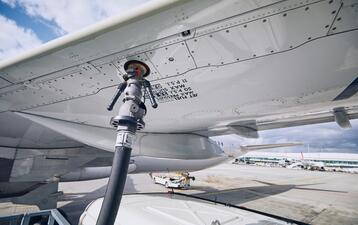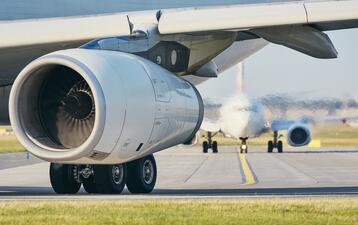Einführung in die nachhaltige Luftfahrt
*Übersetzung folgt*
The impact of aviation on the environment is of great importance to all stakeholders involved. Public concern about climate change and the associated environmental and societal consequences require regulation and multiple improvements to the aviation sector's sustainability performance: How to lower the carbon footprint of apron processes? What are the challenges and potentials linked to sustainable aviation fuels (SAF) or hydrogen-powered aircrafts? How can airports strengthen their resilience to the impacts of climate change on airport operations? These questions represent only a very small part of the content of this two-day introduction course about sustainable aviation. Especially for someone new to the topic of environmental protection and sustainability in aviation, it can be a major challenge to understand the latest technological trends and the associated technical background, legal aspects, operational regulations and requirements, and their interrelationships.
This course is intended for a wide range of interested parties who want to approach the topic of sustainable aviation and the related issues of noise, emissions and air quality, and climate change at both the global and local levels. Attendees will get a solid overview on actions and mitigation measures to lower the impact of aviation on global climate and the airport environment. All lectures will contain state-of-the-art technological knowledge on mitigation measures, based on latest scientific and industrial conclusions, current standards, legal requirements and future trends as well.
This course is the condensed version of the 3 day course Aircraft Noise and Environmental Protection at Airports.
Kursinfo
Ort:In-houseSprache:Englisch
Dauer:2 Tage
Anbieter:airsight GmbH
Inhalt
Aviation and the impact on the environment
- Global level: Greenhouse gas emissions (GHG), e.g. CO2 emissions
- Local level: aircraft, emissions and air quality, waste, water, wildlife and biodiversity
Regulatory framework
- International standards and policies, European regulations, directives and specifications
Environmental impact mitigation measures
- Technological: e.g. engine technology, aircraft technology
- Operational: e.g. noise abatement flight procedures, single engine taxi
Environmental management systems
- Airport Carbon Accreditation
- EU EMAS / ISO 14001
Market-based measures on greenhouse gas reduction
- CORSIA
- EU-ETS
Future concepts, developments and technologies on aviation sustainability
- Aircraft: Sustainable Aviation fuels (SAF), Electric aircraft / hydrogen aircraft
- Sustainable energy production on site and associated risks
- Sustainable operational concepts (e.g. TaxiBots)
Methods for evaluating and assessing sustainability and associated impacts on people and the environment
Adaptation and resilience of airports on climate change impacts
After participating at this training course, attendees will have the following knowledge:
- Aviation impact on global climate and the environment around airports
- Relevant legal requirements, standards and policies
- Environmental management systems and market-based measures on greenhouse gas reduction
- Mitigation measures and global initiatives to lower impacts of aviation on the environment
- Challenges and potentials of climate change on airport systems: future aircraft technologies, airport efficiency, operational concepts, and climate resilience
Referenten
M.Sc. Christoph Strümpfel
Christoph Strümpfel ist Experte für nachhaltige Luftfahrt im Beratungsteam von airsight. Er ist verantwortlich für alle Trainingskurse zum Thema nachhaltiger Luftverkehr und Umweltschutz an und gibt sein Wissen und seine praktischen Erfahrungen an andere nationale und internationale Luftfahrtexperten weiter.
Nach seinem Abschluss als Master of Science in Luft- und Raumfahrttechnik an der Technischen Universität Berlin arbeitete er als wissenschaftlicher Mitarbeiter und Dozent am Fachgebiet Flugführung und Luftverkehr der TU Berlin. Christoph Strümpfel konzentrierte sich in seiner wissenschaftlichen Laufbahn auf die Modellierung von Fluglärm und Schadstoffemissionen, die Lärmberechnung von UAS/eVTOL und die Optimierung von Flugverfahren im Hinblick auf Umweltziele. Für airsight hat er mehrere Umweltgutachten und Fallstudien durchgeführt, unter anderem in Berlin, Leipzig, Luxemburg, Malta und Dubai.
Als Mitglied der Fluglärmkommission des Flughafens Berlin-Tegel war Christoph Strümpfel für die Durchführung von Feldstudien zu Continuous Descent Operation (CDO) und lärmmindernden Abflugverfahren im Hinblick auf Fluglärmmodellierung und -überwachung verantwortlich. Da er sich in seiner beruflichen Laufbahn auf die Modellierung von Fluglärm und Emissionen konzentrierte, sammelte er umfangreiche Erfahrungen mit dem Aviation Environmental Design Tool (AEDT) der FAA.
Zielgruppe
- Aerodrome accountable managers
- Aerodrome engineers and planners
- Aerodrome quality and compliance managers
- Aerodrome services and ground handling contractors
- Aerodrome trainers
- Airline representatives
- Civil aviation authority representatives
- Approval authority representatives
- Air Navigation Service Provider
- Environmental engineers
- All Professionals who want to familiarize themselves with sustainable aviation
Organisatorische Details
airsight bietet diesen Lehrgang auf Anfrage als In-House-Schulung an.
Nach erfolgreicher Kursteilnahme erhalten alle Teilnehmer ein airsight-Zertifikat nach EASA-Trainingsregularien, welches weltweit in der Luftfahrtbranche anerkannt ist.
Über unsere Lehrgänge
Zertifizierte Qualität
airsight verfügt über ein nach ISO 9001 zertifiziertes Qualitätsmanagementsystem, in dessen Mittelpunkt die Maximierung des Kundennutzens steht. Wir arbeiten ständig an Verbesserungen – so auch bei unseren Lehrgängen, die wir auch anhand des Teilnehmerfeedbacks kontinuierlich optimieren.

 Sie wollen 5+ Teilnehmer anmelden? Fragen Sie nach einem In-House-Kurs an Ihrem Standort oder online!
Sie wollen 5+ Teilnehmer anmelden? Fragen Sie nach einem In-House-Kurs an Ihrem Standort oder online!


